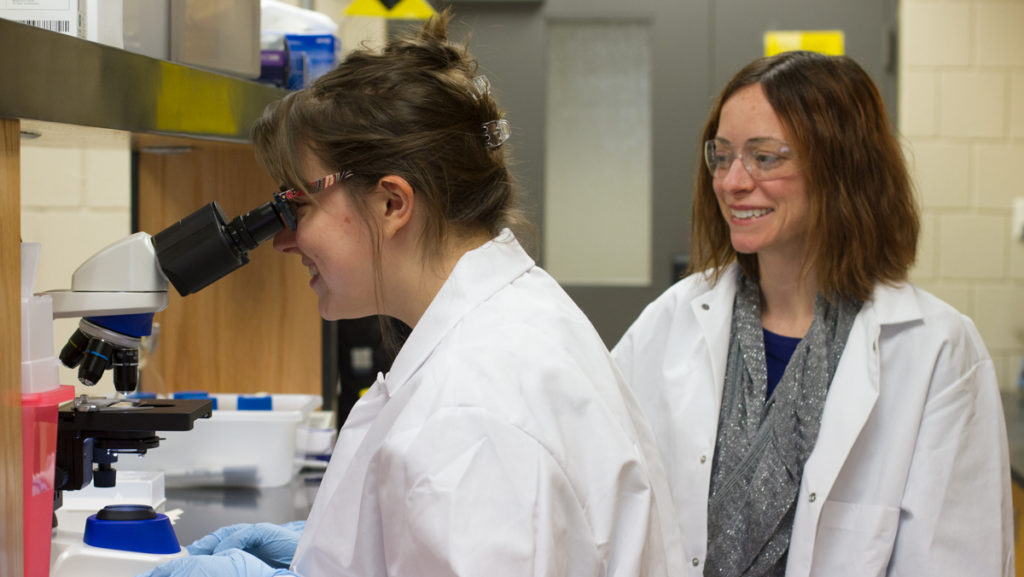Two professors created Ithaca College’s first interschool Biological Safety Level-2 laboratory in Spring 2018 to simultaneously research a howler monkey population from Costa Rica and environmental microbes.
Lisa Corewyn, assistant professor in the Department of Anthropology, and Kari Brossard Stoos, assistant professor in the Department of Health Promotion and Physical Education, both needed a Biological Safety Level-2 laboratory for their research. Mark Ross, environmental safety specialist in the Environmental Health and Safety Department, introduced the professors.
A Biological Safety Level-2 laboratory is a designation given to laboratories that work with agents associated with human diseases that pose a moderate health hazard. Once introduced, the professors decided to share the space, creating a partnership between the School of Health Science and Human Performance and the School of Humanities and Sciences.
This collaboration has inspired both professors to begin planning ways to combine their work and teach the lab together. The professors have been sharing the lab, but their individual lab times do not overlap. As a result, students from different departments do not work together.
Corewyn’s research involves studying monkeys in the wild. Each summer, she conducts field research in Costa Rica and brings monkey fecal matter samples to Ithaca College. Students in Corewyn’s lab have been extracting and studying DNA from the fecal matter.
Corewyn said students in the lab will be looking at which monkeys are genetically related and whether or not dominant males are fathering more children. Students are studying the DNA with an objective to learn whether or not there is enough genetic variation within the population of howler monkeys from Costa Rica.
Brossard Stoos works with microbiology related to health sciences. Students in the lab have been working on assessing environmental microbes. The students collect samples from around the campus, such as bacteria on a door handle, to analyze and identify the organisms.
Students elected to take Corewyn and Brossard Stoos’ lab for a number of reasons, ranging from research or study credit to independent study. Some students joined out of interest to work with either professor and their correlating research or for paid work. One student, junior Maura Benner, is working with Brossard Stoos as a DANA student intern. The DANA student internship program provides educational work experiences for students receiving need-based financial aid from the college.
Benner said she worked with setting up the lab last semester and participated in the lab this semester as part of her DANA internship.
She said she is interested in pathology-related fields, so studying microbial resistance pertains to her area of study.
“This is going to be really applicable to what I want to do when I go off to the workforce,” Benner said. “This is giving me some really great training.”
Sophomore Ashley Stacey said she is working with Corewyn after a class she took with Corewyn last year gave her a better understanding of anthropology and its applications. She said that in addition to working in the lab, she plans to go to Costa Rica this summer with Corewyn to conduct field research with the howler monkeys.
Corewyn said the two professors are hoping to combine their research in the future to have the students work in a multidisciplinary lab.
While Corewyn said the plans are not concrete at this point in time, the professors are thinking about doing a microbiome project with the howler monkeys. Microbiomes are gut microbes — bacteria that is in the gut.
“It brings us together and makes us think about the research we’re doing and how students can get involved in that research in different ways than we ever would have before,” Corewyn said.








